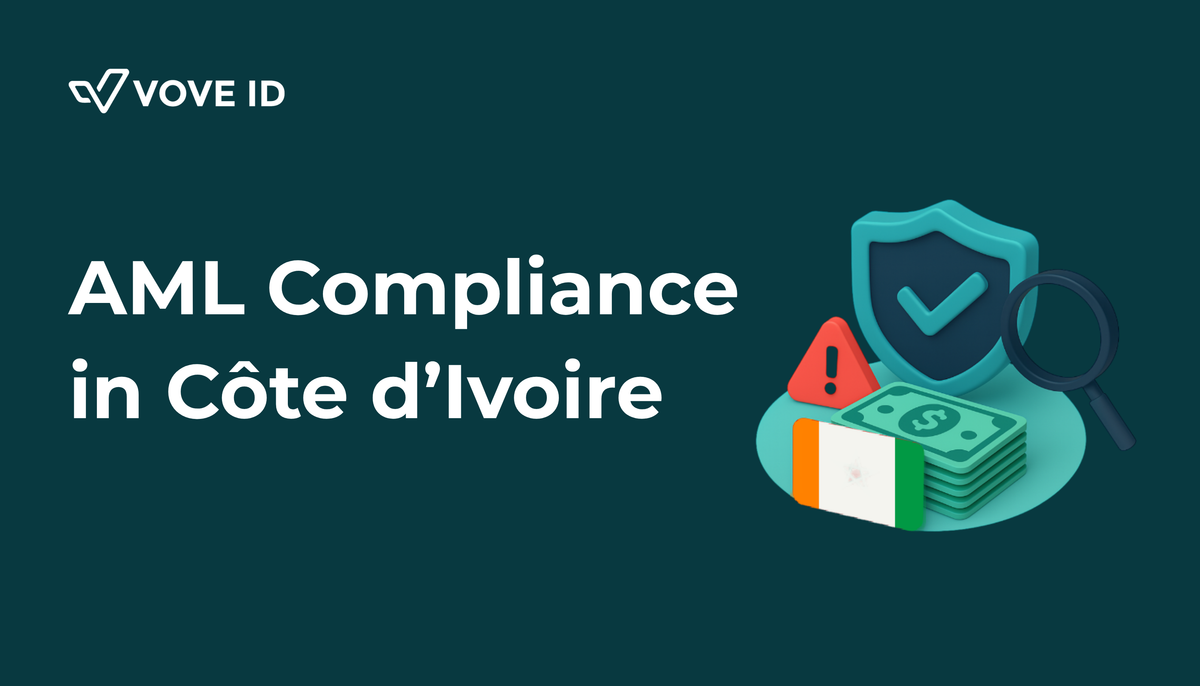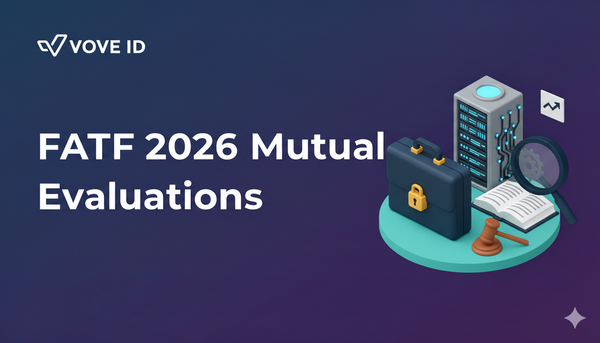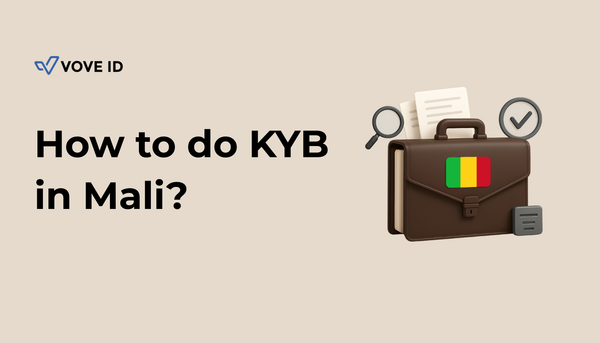AML Compliance in Côte d’Ivoire: 2025 Guide
KYC, KYB & AML compliance in Côte d’Ivoire: 2025 guide covering regulations, FATF grey list, eKYC trends, digital identity, fintech challenges, and solutions like VOVE ID.

Côte d’Ivoire, a vibrant economic hub in West Africa, is experiencing rapid growth in fintech, digital transformation, and foreign direct investment (FDI). With mobile money penetration reaching over 70% of the adult population and fintech startups driving financial inclusion, the country is positioning itself as a leader in the region. However, this expansion underscores the critical role of Know Your Customer (KYC), Know Your Business (KYB), and Anti-Money Laundering (AML) compliance. These measures ensure trust in financial systems, mitigate risks from illicit activities, and facilitate secure cross-border transactions while strengthening overall regulatory compliance in the fintech ecosystem. Digital identity solutions like VOVE ID are becoming indispensable, enabling fintechs to streamline KYC/KYB processes, verify users securely, and maintain compliance with FATF standards.
The topic's relevance is amplified by recent regulatory pressures, including Côte d’Ivoire's placement on the FATF grey list in October 2024 for strategic AML/CFT deficiencies. As of September 2025, the country remains under increased monitoring, with mandates to enhance prosecutions, asset recovery, and beneficial ownership verification. GIABA's oversight and alignment with international standards are pushing for stronger digital identity developments, making KYC/KYB/AML essential for fintechs and businesses aiming to attract FDI while navigating regulatory changes.
Regulatory Framework
Côte d’Ivoire's AML/KYC/KYB regulations are anchored in regional and national laws, harmonized under the West African Economic and Monetary Union (WAEMU). Key legislation includes Ordinance No. 2023-875 on combating money laundering, terrorist financing, and proliferation (replacing Act No. 2016-992), and Ordinance No. 2022-237 on administrative sanctions. These align with FATF's 40 Recommendations, emphasizing customer due diligence (CDD), enhanced due diligence (EDD), ongoing risk assessment, and beneficial ownership transparency.
Supervisory authorities include:
- CENTIF-CI: The Financial Intelligence Unit (FIU) responsible for suspicious transaction reports and AML investigations.
- BCEAO: The Central Bank of West African States, overseeing financial institutions and issuing directives like Instruction No. 007-09-2017 on AML rules for banks.
- COBA (WAEMU Banking Commission): Supervises banks and enforces compliance.
- DGI (General Tax Directorate): Manages tax-related KYB and beneficial ownership registers.
- RCCM: The Commercial and Credit Registry for business registrations.
Côte d’Ivoire connects to international standards via FATF and GIABA, with a 2023 mutual evaluation rating the country partially compliant in areas like CDD for designated non-financial businesses and professions (DNFBPs). The new Register of Beneficial Owners (RBE) Law No. 2024-362, operational since June 2025, mandates central BO registration to boost transparency and reinforce the national AML framework.
Côte d’Ivoire's cocoa sector, accounting for 40% of global supply, is a high-risk area for money laundering due to trade discrepancies, highlighting the need for strong KYB in commodities.
KYC / KYB / AML Process in the Country
In Côte d’Ivoire, KYC/KYB/AML processes require robust identification to prevent money laundering and terrorist financing. For individuals (KYC), mandatory documents include the National Identity Card (CNI), passport, or residence permit, verified against government databases. Businesses must conduct CDD, including risk assessments and ongoing monitoring.
For KYB, entities register with RCCM, providing articles of association, shareholder details, and beneficial owner information (defined via a cascade approach: ownership >25%, control, or senior management). EDD applies to high-risk clients, such as politically exposed persons (PEPs), involving source-of-funds checks and senior approval.
Specific features include eKYC via digital platforms, with BCEAO supporting API access to national ID registries for real-time verification. This digital onboarding trend is central to expanding financial inclusion in Côte d’Ivoire. Mobile money operators must implement tiered KYC, starting with basic details for low-value accounts and escalating to full biometrics for higher limits. Records must be retained for 10 years, with updates required upon material changes.
Key Challenges for Businesses
Businesses in Côte d’Ivoire face several hurdles in KYC/KYB/AML compliance. Limited ID coverage affects about 30% of the population without formal IDs, complicating onboarding in rural areas. High reliance on cash transactions (over 50% of the economy) increases money laundering risks through informal channels.
Regulatory pressure from FATF's grey list burdens fintech startups with stringent reporting, while technological gaps—such as outdated legacy systems and low digital integration—hinder efficient CDD/EDD. Additionally, weak supervision of DNFBPs (e.g., lawyers, real estate) and inactive entities (50% of registered taxpayers) pose risks to beneficial ownership accuracy and undermine the effectiveness of the national AML framework.
Opportunities and Trends
Despite challenges, opportunities abound in Côte d’Ivoire's fintech landscape. The growth of mobile money—led by platforms like Orange Money and MTN MoMo—drives digital onboarding, with over 15 million active users. Adoption of biometrics and AI-driven KYC/KYB is rising, enabling faster compliance and financial inclusion.
Trends include compliance automation via eKYC tools, fostering FDI in sectors like agriculture and energy. The rise of RegTech solutions and fintech partnerships also accelerates secure innovation in the market. Cross-border partnerships with WAEMU neighbors are expanding, supported by BCEAO's regional AML frameworks. Solutions like VOVE ID, offering seamless digital identity verification, are helping businesses streamline AML screening and reduce onboarding times, making them ideal for fintechs entering the market.
Role of Technology
Technology plays a pivotal role in easing KYC/KYB/AML compliance in Côte d’Ivoire. Digital identity solutions automate ID checks, beneficial ownership verification, and AML screening, cutting costs by up to 50% and accelerating processes.
Platforms leveraging AI and biometrics integrate with government APIs for real-time eKYC, addressing gaps in manual verification. For instance, VOVE ID provides secure, reusable digital identities that ensure robust user authentication and compliance with FATF standards, reducing friction for businesses. This "verify once, use everywhere" approach is particularly valuable for fintechs handling high-volume onboarding.
Moreover, tools like VOVE ID enhance EDD by screening against global watchlists, helping firms navigate regulatory pressures efficiently and maintain international compliance standards.
Conclusion
In summary, KYC/KYB/AML compliance serves as a cornerstone for building trust and attracting FDI in Côte d’Ivoire's evolving economy. By adhering to the regulatory framework and leveraging digital innovations, businesses can mitigate risks and capitalize on growth opportunities.
Digital Identity Matters: VOVE ID enables fintechs in Côte d’Ivoire to verify customers quickly, automate KYC/KYB checks, and stay fully compliant with FATF standards, even in a grey-list jurisdiction.




